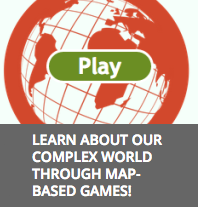Based on a submission by Karl Ola Ahlqvist about his NSF-funded project to use map games for teaching and learning.

The GeoGame framework turns online maps, like those in Google and Bing maps, into a game board. Any place in the world can be experienced through a game that gives a micro-experience of what life is like in other places of the world. In the first game “GeoGame – Green Revolution – India” users have learned what goes into farming in emerging economies and why farming in these economies is often a matter of survival rather than a means of becoming wealthy.
NSF Project Information
Title: EXP: GeoGames – Online Map Games for Teaching and Learning through a Real-World Spatial Perspective
Award Details
PIs: Karl Ola Ahlqvist, Andrew Heckler, Rajiv Ramnath
In the first two years of this project, researchers at The Ohio State University developed GeoGame – Green Revolution – India, and over 600 students have test-played the game as part of an undergraduate geography course. In a playful way, these students have learned facts about farming in India and, in particular, have learned to appreciate how complex farming can be!
The data collected from our user studies help us understand:
- What are key components and needed functionality in this learning technology
- How educators can naturally integrate an online, social game activity into the classroom.
- How a virtual micro-experience can generate critical thinking and impact learning about a far-away place when the students can relate to what they experienced rather than what they have read.
“The mapping of the fields on a satellite image gridded out gave the farming a more realistic feel.”
Our first results demonstrate that many students who play the game increase their understanding from simple explanations, to an awareness of the complexity of agriculture in the developing world. Our continued research will seek to determine how that awareness is developed and how the technology can be used to take the students one step further to formulate explanations of what happens in the game.
“…I started to consider success in the context of the Green Revolution in India. Before I was thinking about success in the American context, […] That is not the reality in India. The definition of success changed from earning money to simply surviving”.
The innovation allows almost any type of board game to be played on top of a current or historic real world map. This also means that the game can directly access and allow any known real-world information to affect the game play. Just imagine playing the popular game RISK with your friends, but in Google Earth, on a current or historic map, allowing real-world information on economy, population, and other conditions affect the game in real time. Or, playing Farmville in a village close to you, or in a faraway Indian village, planting, buying supplies, fertilize, irrigate, trade goods, and so on. You would have a lot of fun, while learning a lot about real-world facts and complex, human-environment interactions.
Learn more at the GeoGame project web site.

